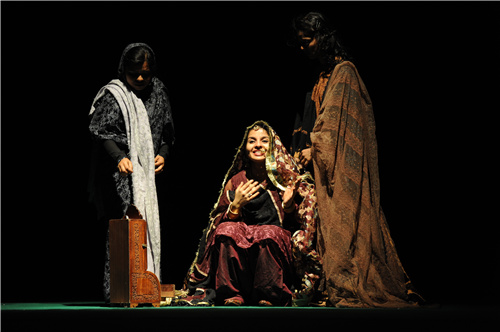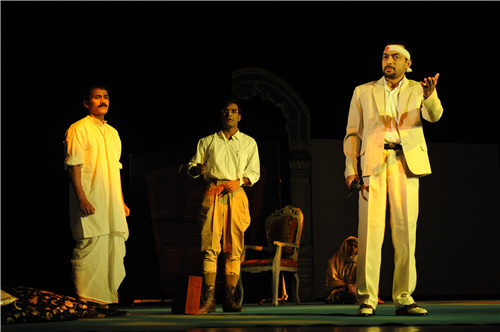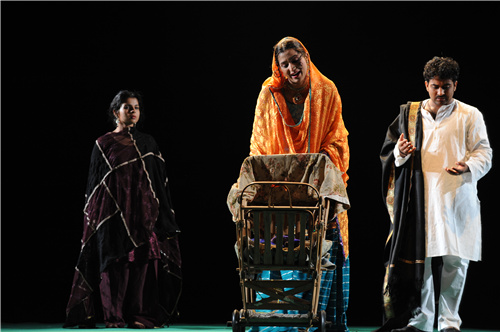
Director: Dinesh Khanna
Institution: National School of Drama, India
Venue: Experimental Theatre, the Central Academy of Drama, China
Time: 19:15~21:00, May 20/19:15~21:00, May 21, 2009
Event: ATEC 4th International Forum

Director’s Notes
Adaptation? Why? The question is a relevant one when one attempts to root out a masterpiece from its origin and to fit it in an alien like circumference. But is the ambience created only from the geographical, lingual, and national? From breed and colour only? Chekhov, for me, provides an enormous prevalence of this thought. But he was Russian! What then, is the iota, that with negation to that endemic inevitability, explores uniformity at Russian, American, French, Asian, German, Spanish and innumerable other surfaces? Man, his being. His thirst for 'being-ness'; this, perhaps, is such an ultimate state that it causes the basic conception of society that belongs to man, to humanity. And this very element forms his basic ambience. The plausibility of that circumference is for bigger things. His motives, his applications, his dreams, intricacies of life, his desires - their fulfilment or failure - all establish the universal purport of that very conception of Man.
Three Sisters could have been staged exactly as it is. Masha could have been Masha, Irina and Olga could have remained the same Olga and Irina. But - Masha to Mehar, Irina to Anjum and Olga to Afshan - does this metamorphosis, at any level, set the scale of alienness for each other? A little even? Likewise Andrei and Ashraf Chebutykin and Chandarlal or Tuzenbak or Jahangir and Solyony or Kabir and all such others, can they sound different or separate from each other? Numbers and this sharp and acute eye makes Chekhov capable of rooting and catching hold of Masha, Irina or Olga from any, even the farthest, corner of the universe.
And then emanates the fertility of life-in an extremely awful form. For me, the recognition of the universal rather than local import of irony in the Three Sisters, becomes even clearer within a perspective of more than 60 years of independence as well as partition, in terms of the breaking of an age-old common cultural heritage, the distances rising up in common psyches and the negation of positivity. The collapse of a harmonious language, man's going on to be , although unwillingly , a part of the fission of the political , religious , social and culture values makes one wonder about what dreams will remain thereafter and what will remain behind?
Through my exploration of these issues, Chekhov stood by me throughout the exercise and I could not be impertinent enough to keep myself distant from him. But I certainly committed one act of impudence, which I could not help, and which entailed holding onto him firmly on ideological grounds. And moreover, the students who shared this event with me, experienced him directly, in their very first classroom exercise with me, observing all along, the very fine and minute analogy between Russians and Indians.
A theatre performance should not be restricted by technicalities. Chekhov himself never had much faith in technicalities. I, personally, have the view that the content gets subdued under the shadow of technical grandeur. In some performances we see several technical aspects being adopted and these usually have to do with the pace of the play. Likewise in writing too, a background of the superimposition of Indian contexts with the original idea is very much there. The external cover of the characters is Indian. They, by using the mediums of poetry and in their own idiom, proceed to tell their stories. But the tragic ambience is universal.
And lastly, my heartfelt gratitude to all the associates and students who, with their efforts and precious suggestions, have made this performance possible in practical terms, be if the field of scripting or any other area.

Synopsis
The Three Sisters, considered to be one of Chekhov's most moving and sensitive dramas, reflects the pervasive pessimism of its era. The play examines the lives of the Prozorovs, a Russian family who live in a provincial garrison town far from Moscow and tells the story of the three daughters of the family, who despise their small-town life Though the women pine for the glamour of Moscow, where they previously lived, they refuse to do anything to change their unhappy lives. Chekhov used the Prozorov family as an analogy for the futility and despair experienced by the Russians of that era. Since its initial production, The Three Sisters has been widely acclaimed for its subtle artistry and insight.
The Three Sisters, Masha, Olga, and Irina, all long to return to Moscow and spend their time bemoaning their humdrum lives. As the male head of the family after their father dies, their brother Andrey is thought to be their only hope for a secure future. But he spoils both his future and his sisters' by marrying Natasha, a greedy and vulgar woman who eventually forces the sisters to leave their own home. Rather than studying, Andrey spends his time gambling, while Masha, Irina, and Olga fail at jobs, marriage, and romance. In the end, as all their dreams are uniformly shattered, each sister ponders why life has brought her so much pain.
The Three Sisters, like Chekhov's earlier plays, intertwines the mundane and the tragic. He focuses on man's inability to be happy and his staunch rejection of any promise in life. The Three Sisters uses a subtle form of indirect action that, for Chekhov, mirrored real life. If reality is paced in a certain fashion, Chekhov reasoned, his plays should reflect that reality
In 1901, The Three Sisters was presented by the Moscow Art Theatre. Early critics, especially Russian commentators, interpreted the play as yet another chapter in the ongoing saga of Russian landowners' demise. Other criticism focused on a perceived lack of storyline and dramatic conflict in the work. Scholars have consistently pointed to the careful construction of the play. While The Three Sisters may appear static in print, it is an extremely complicated play to perform. Because The Three Sisters, like Chekhov's other dramas, called for a performance style that was less grandiose and more given to inflection and allusion, a flamboyant production could easily obscure the intention of Chekhov's work. The noted director, Konstantin Stanislavski, developed a psychological, introspective dramatic style appropriate to Chekhov's plays. In later years The Three Sisters' depiction of futility caused Chekhov to be considered a precursor to dramatists of the Theatre of the Absurd.

